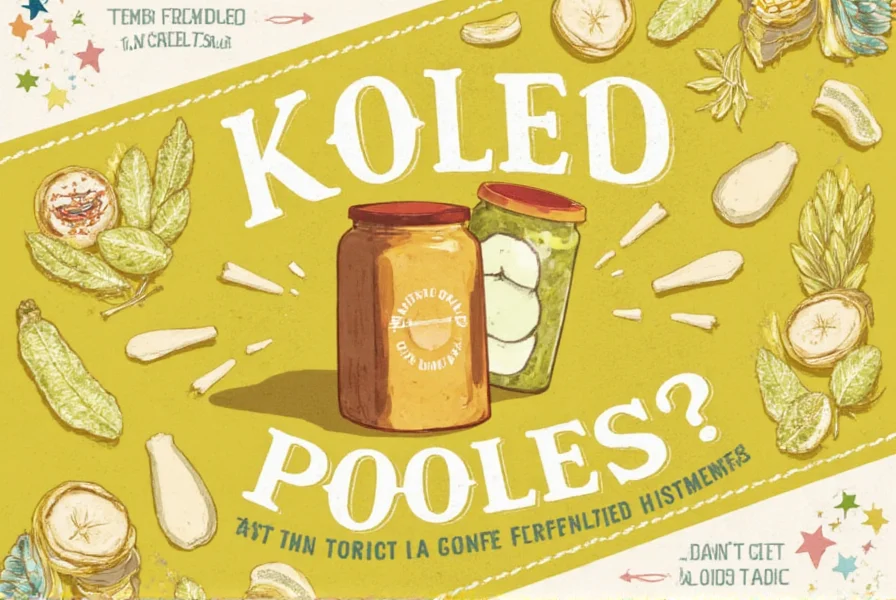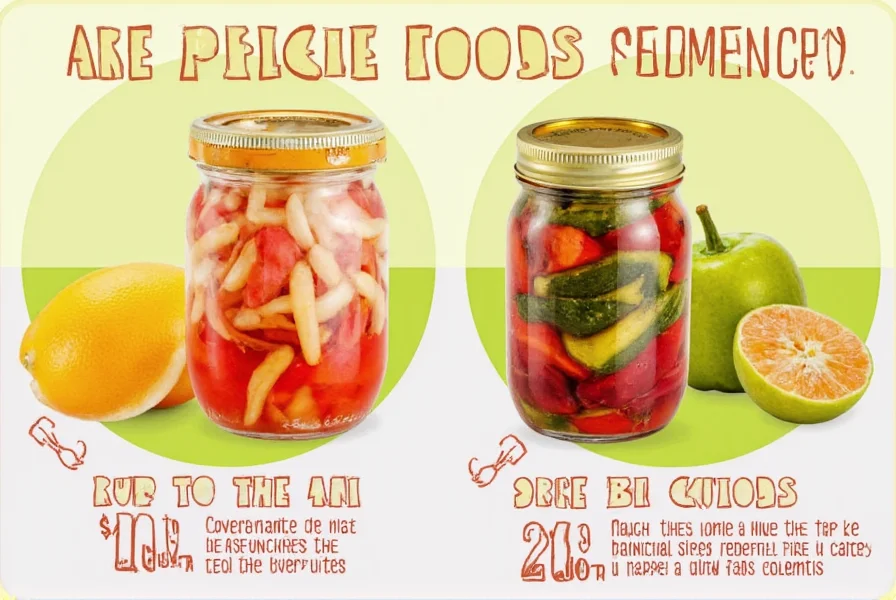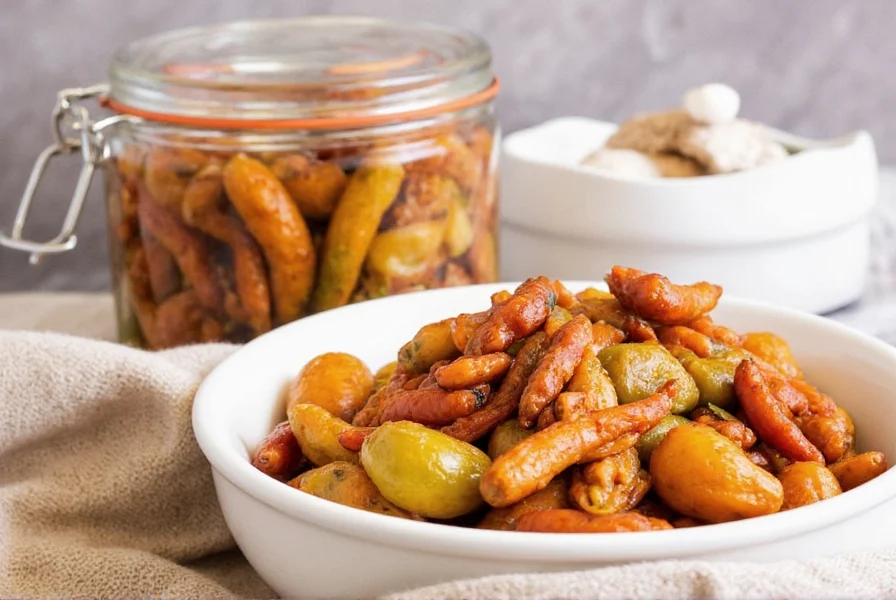Are pickled foods fermented? The answer depends entirely on the preservation method used. While all fermented foods are technically pickled, not all pickled foods are fermented. This article explains the key differences between vinegar pickling and lacto-fermentation, how to identify truly fermented products, and why fermented pickles offer significant gut health benefits.
When you see "pickles" at the grocery store, you might assume they're all fermented. But the reality is more nuanced. Vinegar-based pickles (like most commercial dill pickles) are preserved through acidification, while salt-brine pickles undergo natural fermentation. This fundamental difference affects both taste and health benefits.
| Method | Description | Preservation Agent | Common Examples | Probiotic Benefits |
|---|---|---|---|---|
| Vinegar Pickling | Food soaked in vinegar or acidic brine | Vinegar, lemon juice | Commercial dill pickles, quick pickles | No probiotics |
| Salt Brine (Lacto-Fermentation) | Natural fermentation using salt | Salt & water | Kimchi, real sauerkraut, true fermented pickles | Yes, full of live cultures |
Key takeaway: Only salt-brine fermented pickles contain live probiotics that support gut health. Vinegar pickles lack these beneficial bacteria because the acidification process kills microorganisms.

How to Tell If Your Pickles Are Truly Fermented
When shopping for fermented pickles, look for these three critical indicators:
- Ingredients List: Should contain only salt, water, spices, and vegetables. Vinegar or citric acid means it's not fermented.
- Label Claims: "Unpasteurized," "contains live cultures," or "naturally fermented" are clear indicators.
- Storage Location: Fermented pickles must be refrigerated to preserve live cultures. Shelf-stable pickles are vinegar-based.
Brands like Bubbies, Wildbrine, and Farmhouse Culture specialize in fermented products and clearly label them as such.

Health Benefits of Fermented Pickles
Fermented pickles offer unique advantages that vinegar pickles cannot match:
- Probiotics: Live cultures support a healthy gut microbiome and improve digestion
- Nutrient Enhancement: Fermentation increases bioavailability of vitamins and minerals
- Enzyme Production: Natural enzymes aid in breaking down food for better absorption
- Complex Flavor: Fermentation develops deeper, more nuanced taste profiles than vinegar alone
Research shows that consuming fermented foods regularly can improve immune function and reduce inflammation. Vinegar pickles provide flavor and preservation but lack these biological benefits.
| Jar Name | Material | Size Options | Special Features | Price Range |
|---|---|---|---|---|
| Himalaya Salt Jar | Glass | 1L, 2L, 5L | Weighted lid system | $30–$80 |
| Fido Jar | Glass + Rubber Seal | 2L, 3L, 5L | Airtight, one-way valve | $35–$90 |
| OXO Good Grips Fermenting Crock | Ceramic | 5L, 10L | Water-sealed lid | $60–$100 |
| Weck Jars | Glass | 1L, 2L, 3L | Clamp-top design | $25–$60 |
Frequently Asked Questions
Are all pickled foods fermented?
No. While all fermented foods are technically pickled, not all pickled foods are fermented. Vinegar-based pickles (like most store-bought dill pickles) are preserved through acidification, not microbial fermentation. Only salt-brine pickles that undergo lacto-fermentation qualify as both pickled and fermented.
How can I tell if store-bought pickles are fermented?
Check three things: 1) The ingredients should list only salt, water, spices, and vegetables (no vinegar), 2) The label should say "unpasteurized" or "contains live cultures," 3) They'll be in the refrigerated section. Brands like Bubbies or Wildbrine often clearly mark their fermented products.
Do fermented pickles have more health benefits than vinegar pickles?
Yes. Fermented pickles contain live probiotics that support gut health, enhance nutrient absorption, and aid digestion—benefits vinegar pickles lack since pasteurization kills bacteria. Both types offer crunch and flavor, but fermented versions provide additional digestive enzymes and increased vitamin bioavailability.
Can I make fermented pickles at home safely?
Absolutely. Use clean jars, a 3-5% saltwater brine (by weight), and submerge vegetables completely. Ferment at room temperature for 3-10 days, burping jars daily. Properly fermented pickles develop tanginess without mold—if mold appears, discard the batch. Starting with small batches helps master the process.
Why do some fermented pickles taste fizzier than others?
Natural carbonation is a sign of active fermentation! Beneficial bacteria produce tiny amounts of carbon dioxide during fermentation, creating a pleasant effervescence. This fizziness disappears when refrigerated but indicates your pickles are alive with probiotics—unlike vinegar-pickled versions which never carbonate.
Final takeaway: The difference between vinegar pickles and fermented pickles isn't just about taste—it's about health benefits. When you choose fermented pickles, you're getting a living food that supports your gut microbiome. Always check labels carefully, and consider trying homemade fermentation for the freshest, most beneficial pickles.












 浙公网安备
33010002000092号
浙公网安备
33010002000092号 浙B2-20120091-4
浙B2-20120091-4